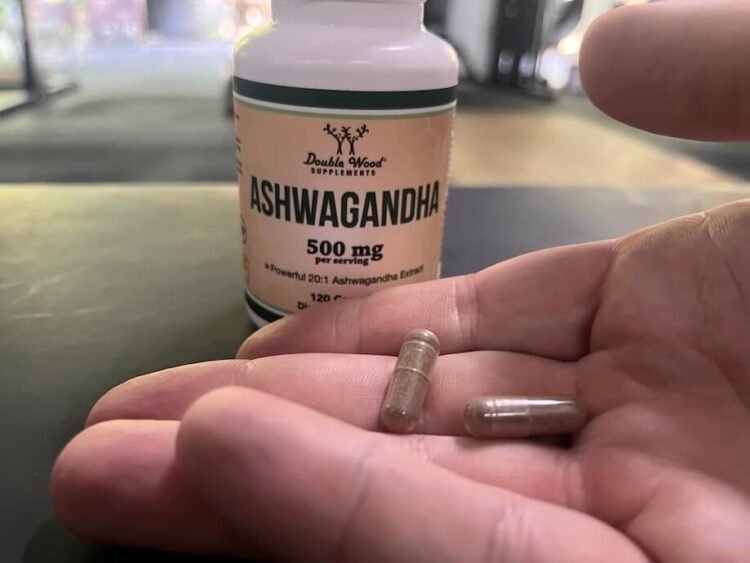We test and review fitness products based on an independent, multi-point methodology. If you use our links to purchase something, we may earn a commission. Read our disclosures.
If you’re like me, you might’ve first heard about ashwagandha on Andrew Huberman’s podcast between an Athletic Greens (popularly known as AG1) promo. Fittingly, AG1 includes ashwagandha—alongside 50+ other ingredients, as we cover in our Athletic Greens Review.
However, when you single out ashwagandha, does it live up to the hype? Can it reduce stress, support energy, and improve overall well-being?
As a dietitian, I love expert insights, but I also love nerding out on the data. I get it, though: not everyone has the time (or desire) to sift through dense studies and scientific jargon. That’s where I come in.
I’ve dug into ashwagandha’s roots (pun intended), exploring the potential health benefits of ashwagandha, its safety, and more. Let’s see if this ancient herb deserves a spot in your supplement stack!
Key Takeaways
- Ashwagandha may help you fall asleep faster and wake up more energized.
- Ashwagandha can be appropriate for beginner and veteran athletes alike.
- Some research1 promotes ashwagandha as a reproductive health booster, particularly in terms of influencing male fertility and testosterone levels.
- Ashwagandha supplements can potentially promote improved cognitive function with enhanced memory, focus, and mental clarity.
- This herbal supplement may improve metabolic markers like blood sugar, cholesterol, and insulin.
What is Ashwagandha?
Ashwagandha1 (Withania somnifera), also known as Indian ginseng or winter cherry, is a powerful herb with deep roots in Ayurvedic medicine. While some sources2 trace its use back to as early as 6,000 B.C., ashwagandha is enjoying a surge in popularity in modern wellness, too—just look at its skyrocketing Google Trends over the past decade!
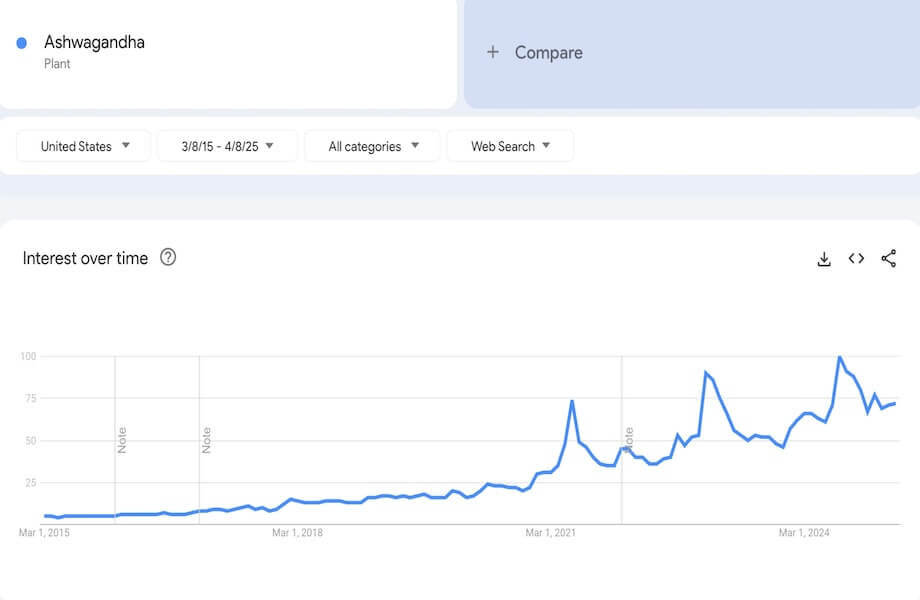
Ashwagandha comes from Sanskrit (the ancient language in Hinduism)—“ashwa” meaning horse, and “gandha” meaning smell, referring both to the root’s distinct aroma and the traditional belief that it imparts the strength and vitality of a horse. It’s considered a rasayana3, a natural product from Ayurvedic medicine with adaptogenic effects along with favorable outcomes on the immune system, mind, and more.
With a diverse roster of potential benefits, is ashwagandha truly an herbal supplement workhorse? Whether taken as a powder, capsule, liquid extract, or another form, let’s explore whether the best ashwagandha supplements can help carry the load.
Benefits of Ashwagandha
Ashwagandha is an adaptogen that can potentially help manage stress and support your overall health. Additional benefits can range from better sleep and performance to brain health, among others.
May Reduce Stress and Anxiety
Ashwagandha is a well-known plant adaptogen4, meaning it can help your body become more resilient to mental and physical stress.
According to a 2025 review5, daily doses of 250 to 500 milligrams of ashwagandha extract may help lower cortisol6, the body’s primary stress hormone. While short-term (acute) stress can be helpful—even lifesaving—chronic stress can wear you down over time, surfacing as anxiety, depression, fatigue, and chronic pain, among other symptoms.
RELATED: Exercise and Stress
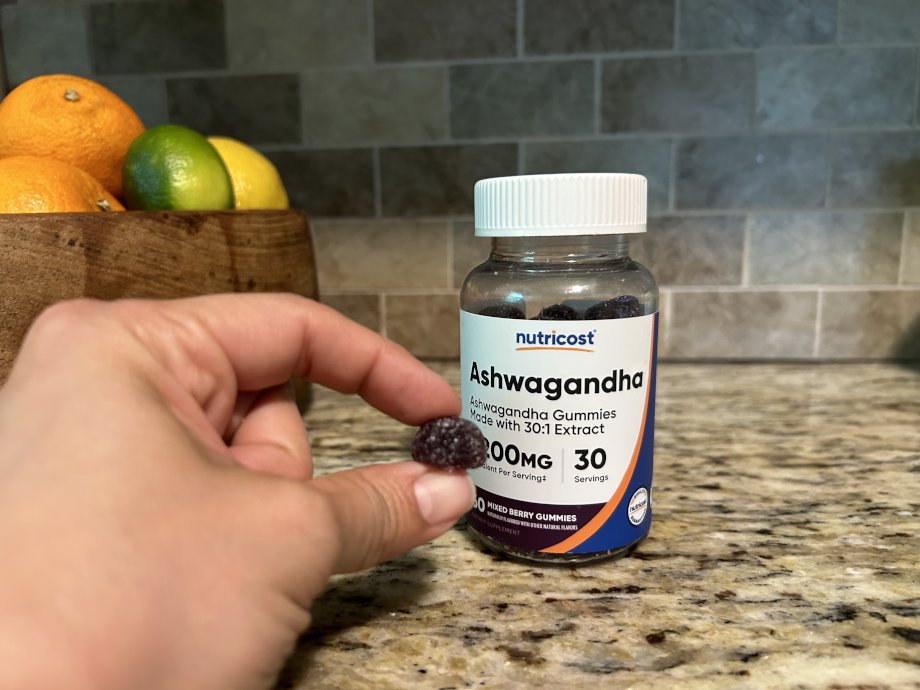
Researchers believe ashwagandha works by calming the brain’s stress response and supporting the activity of GABA, a neurotransmitter that can promote calmness and relaxation. Its potential to improve sleep (more on that, coming up) may also impact how GABA helps reduce stress.
Ashwagandha may have a calming effect on anxiety, too, with effective doses ranging from 125 milligrams to 1,000 milligrams daily. Several studies suggest significant improvements in anxiety levels in healthy individuals and those with Generalized Anxiety Disorder (GAD)5.
May Improve Sleep Quality and Quantity
Ashwagandha might just be the natural sleep support you’ve been dreaming of, potentially improving the quality and quantity of rest. It’s believed to work by binding to receptors involved in sleep regulation, specifically gamma-aminobutyric acid (GABA)5.
Clinical trials5 indicate ashwagandha may help people fall asleep faster, sleep more deeply, and wake up feeling more refreshed. Many participants also report better mental clarity in the morning and reduced anxiety levels.
RELATED: Calories Burned from Sleeping
A 2021 meta-analysis7 finds 600 milligrams daily (or more) of ashwagandha extract, taken for at least 8 weeks, improves sleep.
May Enhance Physical Performance and Fitness
Ashwagandha may offer muscle strength and endurance benefits for beginners, everyday fitness enthusiasts, and elite athletes alike. A 2023 review1 proposes it works by boosting testosterone levels, reducing muscle damage, and offering anti-inflammatory benefits.
In a study8 with elite Indian cyclists, supplementing with 500 milligrams of ashwagandha twice daily for 8 weeks significantly improved endurance, VO2 max, and time to exhaustion.
A 2024 study9 demonstrates taking 300 milligrams of ashwagandha twice daily for 8 weeks—when combined with resistance training— can improve muscle strength, growth, and endurance in healthy men and women. The same dosage may also enhance cardiorespiratory endurance and quality of life in healthy athletic adults, based on a 2021 double-blind, randomized, placebo-controlled trial10.
Even beginners may see benefits, as research11 shows taking 500 milligrams of ashwagandha daily may significantly boost muscle strength, power, and recovery in 18 to 50-year-old men with limited resistance training experience.
May Support Reproductive Health
Ashwagandha’s positive effects on sleep, testosterone, cortisol, and stress levels may help support reproductive health in men and women, as well.
A 2018 systematic review12 suggests ashwagandha may improve male fertility by increasing sperm concentration, volume, and motility. By promoting spermatogenesis (sperm production) and improving sperm quality, it may reduce infertility.
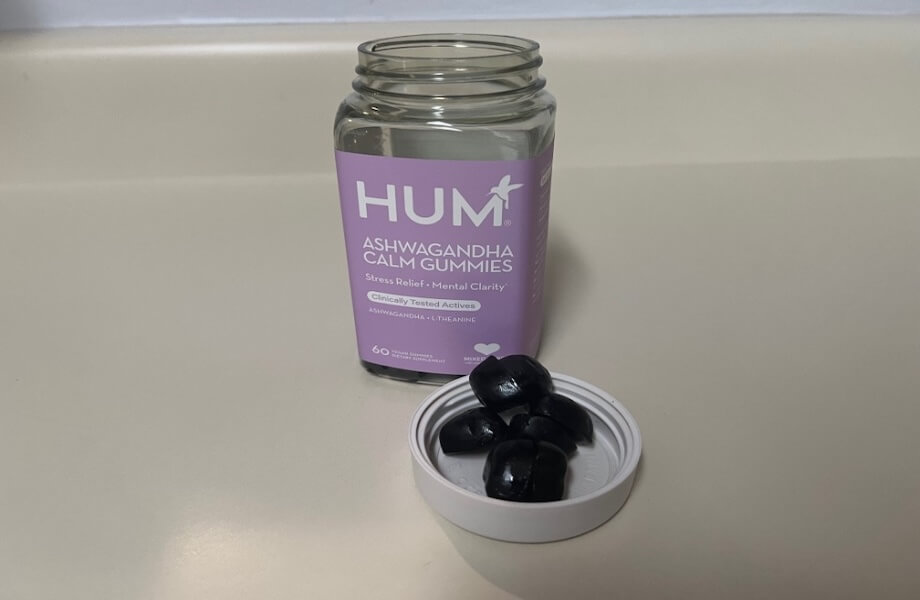
Though research on female fertility is more limited, another 2018 systematic review13 indicates ashwagandha can enhance sexual function, reduce sexual distress, and improve sexual behaviors in women.
May Enhance Brain Health and Cognitive Functions
Regular ashwagandha use may enhance memory, focus, reaction time, and overall cognitive function. Even a 400-milligram dose may improve short-term memory and mental clarity5.
Related: Exercise and Mental Health
Ashwagandha may also support brain health in neurodegenerative conditions like Alzheimer’s, Parkinson’s, and Huntington’s diseases, based on a 2024 review14.
May Reduce Inflammation and Related Conditions
Ashwagandha offers antioxidant properties and may reduce inflammation by lowering C-reactive protein (CRP) levels—a key inflammatory marker. The herb’s withanolide compounds, particularly Withaferin A14, provide its primary anti-inflammatory effects.
Ashwagandha may also offer significant anti-inflammatory effects in chronic conditions such as rheumatoid arthritis, inflammatory bowel disease, and systemic lupus erythematosus14.
May Improve Metabolic Health
A 2020 systematic review and meta-analysis15 suggests ashwagandha benefits metabolic health, improving blood glucose (sugar), hemoglobin A1c (HbA1c), insulin levels, lipid profiles, and oxidative stress markers.
Ashwagandha may support heart health, too, by improving cholesterol levels. Several studies5 have reported beneficial effects on lipid profiles, including reductions in total cholesterol, LDL (“bad”) cholesterol, and triglycerides.
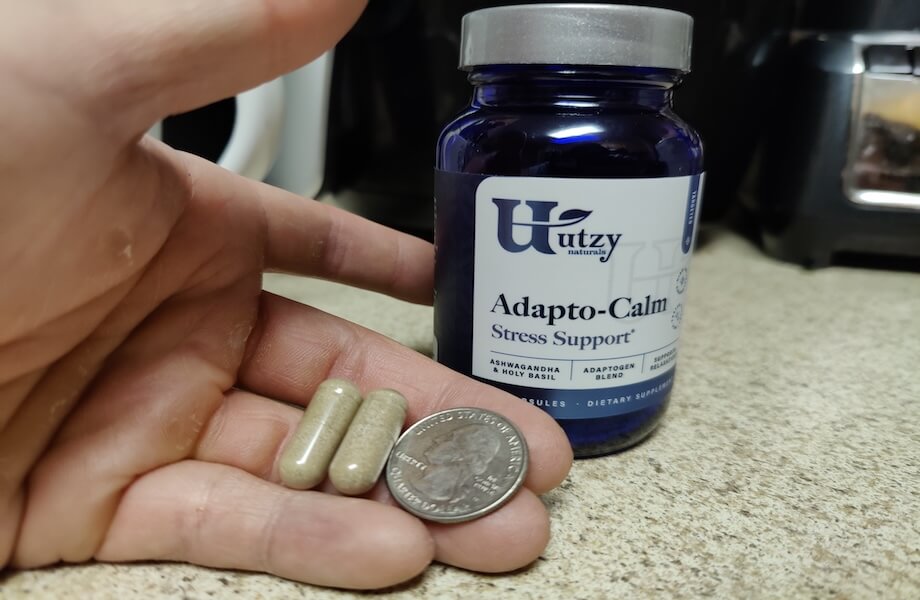
While the results are encouraging, more large-scale human trials are needed to confirm these effects.
How Much Ashwagandha Should You Take?
There’s no official Recommended Daily Value (RDV) for ashwagandha, and the dose depends on your goals and the form used. However, consider these general guidelines:
- Clinical studies have safely used 300 to 600 milligrams per day of a standardized extract, typically taken for 8 to 12 weeks5.
- Some research5 shows 120 milligrams can be effective, with short-term doses up to 1,000 milligrams also used.
- While evidence is limited, some users take periodic breaks as a precaution to prevent tolerance, dependence, and unwanted side effects.
- Concentrated extracts are typically stronger than powders or root-based capsules, meaning you may need less for the same effect.
The Food and Drug Administration (FDA) doesn’t regulate dietary supplements like medications, so we recommend prioritizing third-party tested products from trusted brands. As always, a good precaution is to consult with your personal healthcare provider to find the proper dose for you while being aware of potential side effects and interactions.
Potential Ashwagandha Side Effects And Interactions
Ashwagandha may offer perks, but it’s important to understand its potential side effects and interactions, as well.
Potential Side Effects
Mild to moderate side effects of ashwagandha have been reported16, including:
- Drowsiness and dizziness
- Digestive issues like nausea, bloating, or loose stools
- Dry mouth
- Skin rash
- Appetite changes
- Blurred vision
- Mild sedation
Clinical trials generally indicate similar side effects between ashwagandha and placebo groups, suggesting good tolerability, though drowsiness may be more pronounced in individuals with schizophrenia16.
A few rare reports18 link high-dose ashwagandha (450 to 1,350 milligrams) to liver injury, though all cases resolved after discontinuation. Conversely, a randomized control trial19 found ashwagandha safe and well-tolerated without affecting liver or thyroid hormone levels, though the outcomes were based on healthy volunteers in India.
Potential Interactions
Ashwagandha is generally well-tolerated but may not be suitable for everyone. It may negatively impact and interact with certain life stages, health conditions, or medications.
Life Stages & Health Conditions:
- Children
- Pregnancy and breastfeeding
- Hyperthyroidism
- Hormone-sensitive prostate cancer
- Autoimmune conditions
- Nightshade allergy
Medications:
- Sedatives or central nervous system (CNS) depressants
- Blood sugar or blood pressure medications
- Immunosuppressants
Always consult a healthcare professional before taking ashwagandha, especially if you fall into any of the above categories.
Incorporating Ashwagandha Into Your Diet
Ashwagandha can be easy to add to your routine as its available in multiple forms. Some of the best ashwagandha supplements include:
- Capsules: Quick and convenient, perfect for busy days.
- Pre-workouts: Get the benefits of ashwagandha along with a great workout boost.
- Powders: Offers hydration along with the benefits, though the taste—especially greens powders like AG1—isn’t for everyone.
- Gummies: A fun, tasty choice, but watch out for added sugars; many gummies also contain gelatin, an important factor if following a vegan diet.

When choosing a form, also review the product’s active ingredients. For instance, although there’s no hard rule about the best time to take ashwagandha, a blend with melatonin isn’t ideal if you plan to crush a workout or prefer to take your supplements in the morning.
The Benefits of Ashwagandha: Final Thoughts
Ashwagandha, an ancient adaptogen, has been used for centuries to reduce stress and boost vitality—but there’s more to it than that. Here’s a quick rundown of its potential benefits and other tidbits:
- May improve sleep and enhance physical performance
- May reduce inflammation, potentially easing inflammatory conditions like arthritis
- May support brain, reproductive, and metabolic health
- Clinical studies1 show that 300 to 600 milligrams daily of standardized extract is effective and safe for 8 to 12 weeks
- Some research5 notes benefits at 120 milligrams or short-term doses up to 1,000 milligrams
- Available in many forms—including capsules, powders, and gummies—making it easy to incorporate into your routine
As always, check with a healthcare professional before adding ashwagandha to your diet, especially if you’re pregnant, breastfeeding, managing a health condition, or taking medications.
The Benefits of Ashwagandha: FAQs
What are the benefits of ashwagandha?
Ashwagandha is a popular adaptogen that may help your body better cope with stress and support overall well-being. Research also suggests it could promote better sleep, boost physical performance, support brain and reproductive health, and help maintain a healthy metabolism.
What happens when you take ashwagandha every day?
Taking ashwagandha daily may help reduce stress, improve sleep, and enhance sports performance and cognition. It could also support reproductive and metabolic health. Since optimal dosages vary and there are no clear guidelines, it’s a good idea to consult a healthcare professional before adding ashwagandha to your daily routine.
What is ashwagandha best for?
Ashwagandha is most commonly used to help manage stress, reduce anxiety, and improve sleep. Research also shows it may boost physical performance and support brain, reproductive, and metabolic health.
Does ashwagandha make you lose weight?
Ashwagandha won’t make you lose weight, but it may help. Elevated stress and cortisol levels can lead to belly fat and increase cravings, but a 2016 study19 suggests ashwagandha may help ease those effects by managing stress. It’s also linked to improved muscle growth and recovery, which can support a healthy metabolism and make it easier to maintain or lose weight over time.
References
- Mikulska, P., Malinowska, M., Ignacyk, M., Szustowski, P., Nowak, J., Pesta, K., Szeląg, M., Szklanny, D., Judasz, E., Kaczmarek, G., Ejiohuo, O. P., Paczkowska-Walendowska, M., Gościniak, A., & Cielecka-Piontek, J. (2023). Ashwagandha (Withania somnifera)-Current Research on the Health-Promoting Activities: A Narrative Review. Pharmaceutics, 15(4), 1057. https://doi.org/10.3390/pharmaceutics15041057
- Singh, N., Bhalla, M., de Jager, P., & Gilca, M. (2011). An overview on ashwagandha: a Rasayana (rejuvenator) of Ayurveda. African Journal of Traditional, Complementary, and Alternative Medicines : AJTCAM, 8(5 Suppl), 208–213. https://doi.org/10.4314/ajtcam.v8i5S.9
- Wu, C., Mulakaluri, A., Chaurasia, P., Suryanarayana, S., Singh, A., Krauss, N., Tahir, P., Elder, C., Puthiyedath, R., & Dhruva, A. (2024). A scoping review of Ayurvedic rasayana adaptogens in oncology. Journal of Ayurveda and Integrative Medicine, 15(1), 100879. https://doi.org/10.1016/j.jaim.2023.100879
- Todorova, V., Ivanov, K., Delattre, C., Nalbantova, V., Karcheva-Bahchevanska, D., & Ivanova, S. (2021). Plant Adaptogens-History and Future Perspectives. Nutrients, 13(8), 2861. https://doi.org/10.3390/nu13082861
- Sprengel, M., Laskowski, R., & Jost, Z. (2025). Withania somnifera (Ashwagandha) supplementation: a review of its mechanisms, health benefits, and role in sports performance. Nutrition & Metabolism, 22(1), 9. https://doi.org/10.1186/s12986-025-00902-7
- Thau L, Gandhi J, Sharma S. Physiology, Cortisol. [Updated 2023 Aug 28]. In: StatPearls [Internet]. Treasure Island (FL): StatPearls Publishing; 2025 Jan-. Available from: https://www.ncbi.nlm.nih.gov/books/NBK538239/
- Cheah, K. L., Norhayati, M. N., Husniati Yaacob, L., & Abdul Rahman, R. (2021). Effect of Ashwagandha (Withania somnifera) extract on sleep: A systematic review and meta-analysis. PloS One, 16(9), e0257843. https://doi.org/10.1371/journal.pone.0257843
- Shenoy, S., Chaskar, U., Sandhu, J. S., & Paadhi, M. M. (2012). Effects of eight-week supplementation of Ashwagandha on cardiorespiratory endurance in elite Indian cyclists. Journal of Ayurveda and Integrative Medicine, 3(4), 209–214. https://doi.org/10.4103/0975-9476.104444
- Verma, N., Gupta, S. K., Patil, S., Tiwari, S., & Mishra, A. K. (2024). Effects of Ashwagandha ( Withania somnifera) standardized root extract on physical endurance and VO 2max in healthy adults performing resistance training: An eight-week, prospective, randomized, double-blind, placebo-controlled study. F1000Research, 12, 335. https://doi.org/10.12688/f1000research.130932.2
- Tiwari, S., Gupta, S. K., & Pathak, A. K. (2021). A double-blind, randomized, placebo-controlled trial on the effect of Ashwagandha (Withania somnifera dunal.) root extract in improving cardiorespiratory endurance and recovery in healthy athletic adults. Journal of Ethnopharmacology, 272, 113929. https://doi.org/10.1016/j.jep.2021.113929
- Wankhede, S., Langade, D., Joshi, K., Sinha, S. R., & Bhattacharyya, S. (2015). Examining the effect of Withania somnifera supplementation on muscle strength and recovery: a randomized controlled trial. Journal of the International Society of Sports Nutrition, 12, 43. https://doi.org/10.1186/s12970-015-0104-9
- Durg, S., Shivaram, S. B., & Bavage, S. (2018). Withania somnifera (Indian ginseng) in male infertility: An evidence-based systematic review and meta-analysis. Phytomedicine : International Journal of Phytotherapy and Phytopharmacology, 50, 247–256. https://doi.org/10.1016/j.phymed.2017.11.011
- Nasimi Doost Azgomi, R., Zomorrodi, A., Nazemyieh, H., Fazljou, S. M. B., Sadeghi Bazargani, H., Nejatbakhsh, F., Moini Jazani, A., & Ahmadi AsrBadr, Y. (2018). Effects of Withania somnifera on Reproductive System: A Systematic Review of the Available Evidence. BioMed Research International, 2018, 4076430. https://doi.org/10.1155/2018/4076430
- Guo, S., & Rezaei, M. J. (2024). The benefits of ashwagandha (Withania somnifera) supplements on brain function and sports performance. Frontiers in Nutrition, 11, 1439294. https://doi.org/10.3389/fnut.2024.1439294
- Durg, S., Bavage, S., & Shivaram, S. B. (2020). Withania somnifera (Indian ginseng) in diabetes mellitus: A systematic review and meta-analysis of scientific evidence from experimental research to clinical application. Phytotherapy Research : PTR, 34(5), 1041–1059. https://doi.org/10.1002/ptr.6589
- Elgar, K., & Ashwagandha. (2021). A Review of Clinical Use and Efficacy. Nutritional Medicine Journal, 1(1), 68–78. https://www.nmi.health/wp-content/uploads/2022/12/NMJ_Ashwagandha__A_Review_of_Clinical_Use_and_Efficacy.pdf
- Björnsson, H. K., Björnsson, E. S., Avula, B., Khan, I. A., Jonasson, J. G., Ghabril, M., Hayashi, P. H., & Navarro, V. (2020). Ashwagandha-induced liver injury: A case series from Iceland and the US Drug-Induced Liver Injury Network. Liver International : Official Journal of the International Association for the Study of the Liver, 40(4), 825–829. https://doi.org/10.1111/liv.14393
- Verma, N., Gupta, S. K., Tiwari, S., & Mishra, A. K. (2021). Safety of Ashwagandha Root Extract: A Randomized, Placebo-Controlled, study in Healthy Volunteers. Complementary Therapies in Medicine, 57, 102642. https://doi.org/10.1016/j.ctim.2020.102642
- Choudhary, D., Bhattacharyya, S., & Joshi, K. (2017). Body Weight Management in Adults Under Chronic Stress Through Treatment With Ashwagandha Root Extract: A Double-Blind, Randomized, Placebo-Controlled Trial. Journal of Evidence-Based Complementary & Alternative Medicine, 22(1), 96–106. https://doi.org/10.1177/2156587216641830


